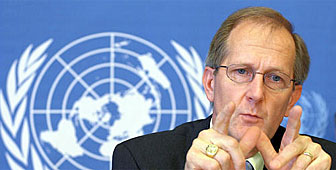Americans baulk at global deal on sustainable development

Ministers from Europe and North America have come up with a common platform ahead of next year's Earth Summit in Johannesburg, but the statement adopted in Geneva failed to paper over continuing differences between the United States and Europe on environmental, trade and development issues.
The two-day meeting brought together the 55 member states of the UN Economic Commission for Europe, which also incorporates North America. These countries are responsible for two thirds of the world’s economic output, but also two-thirds of carbon dioxide emissions, and therefore have a huge role to play in Johannesburg, which is being billed as the biggest intergovernmental meeting in history.
The Swiss Foreign Minister, Joseph Deiss, who chaired the Geneva meeting, said he was “very encouraged” by the “constructive” stance adopted by the Americans at the conference.
“All of the democratic countries are now aware of the need to put more into international cooperation,” he said.
This was the first multilateral conference in which the United States has taken part since the attacks on the World Trade Centre and the Pentagon on September 11. To what extent the US position in Geneva was determined by its desire to build a global coalition against terrorism is open to question.
Fundamental differences remain
What is clear is that fundamental differences remain on a number of key questions. Three of these were identified by Deiss: EU and Swiss proposals for a “global deal” involving all stakeholders in sustainable development; the question of financing through debt relief and overseas development aid; and the “precautionary principle”, or, in other words, reducing greenhouse gas emissions.
Passages in the final ministerial statement on all of these questions had to be watered down. Deiss said the EU and Switzerland would continue to hold talks with the US to try to persuade them to sign up to the global deal.
“There was not a position of no entry (on the part of the Americans). I don’t know what the final outcome will be. We need to make the proposals more concrete to convince the Americans. I am optimistic,” said Deiss, who will act as the region’s spokesman at the summit.
The fear remains that the Bush administration may decide to take a back seat at, or even boycott, Johannesburg, just as it did at the UN climate change conference in Bonn, and the UN racism conference in Durban.
Europe should take lead
This is the first time regional UN commissions have played such a significant role in drawing up the agenda of a major summit, and the Swiss were determined that the European region should take the lead in setting the agenda for Johannesburg, which will address what has happened since the first Earth Summit in Rio de Janeiro ten years ago, and set out the new priorities for sustainable development in the coming years.
Switzerland, one of the few countries in the world where sustainable development is laid down as an objective in the constitution, has taken it upon itself to play a leading role in the European preparations for the Earth Summit.
It is concentrating its efforts around six major themes: mountain regions, fresh water supplies, climate change, social development, combating poverty, trade issues and good governance.
by Roy Probert

In compliance with the JTI standards
More: SWI swissinfo.ch certified by the Journalism Trust Initiative
You can find an overview of ongoing debates with our journalists here. Please join us!
If you want to start a conversation about a topic raised in this article or want to report factual errors, email us at english@swissinfo.ch.